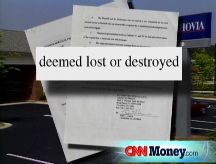Senate inches along on housing rescue
The debate over foreclosure prevention legislation is set to continue, but signs point to eventual approval.
NEW YORK (CNNMoney.com) -- An omnibus housing rescue package, some elements of which have been debated in Congress for years, had been on track Wednesday to finally move toward enactment but hit a speed bump that puts in question when lawmakers will vote.
In a press conference Wednesday morning, Senate minority leader Mitch McConnell, R-Ky., said he and the Senate majority leader, Harry Reid, D-Nev., have reached a general agreement on "the most pressing amendments" and that the bill "is likely to pass this week."
But the Senate got bogged down by a procedural maneuver by one senator who insists the body include a series of energy tax breaks in the housing bill.
Banking Committee Chairman Christopher Dodd, D-Conn., said lawmakers were close to getting passage on the bill "if only we can get it to the floor."
The package would create a new government-backed program to help at-risk borrowers. It also would change how two of the biggest players in the mortgage market are regulated and alter key rules in how they may operate. Furthermore, it proposes measures intended to spur activity in the housing market.
Dodd said he and other leading senators were engaged in talks with House Financial Services Chairman Barney Frank, D-Mass., and House Speaker Nancy Pelosi, D-Calif., to iron out differences between the Senate version of the housing package and the foreclosure-prevention bill that the House passed in May.
Once those differences are worked out, the bill the Senate votes on would likely pass the House as well. What remains unclear is whether lawmakers can get a bill to President Bush on July 4, the deadline Dodd and Shelby have pushed for.
The White House has signaled that President Bush would veto the Senate bill in its current form. As a result, one element lawmakers are likely to discard is a provision that would give $4 billion in aid to states to buy up foreclosed properties - a measure the White House contends would do more to aid lenders than homeowners.
Even with amendments, the key measures likely to appear in the final bill are intended to prevent foreclosures, spur the housing market and increase oversight of Fannie Mae and Freddie Mac.
The provision that has garnered the most attention is one that would allow the Federal Housing Administration to insure up to $300 billion in new loans for at-risk borrowers if lenders agree to write down loan balances below the appraised value of borrowers' homes.
The program, which would be voluntary for both lenders and borrowers, would be paid for in the Senate bill by the premiums borrowers pay and by fees from Fannie (FNM, Fortune 500) and Freddie (FRE, Fortune 500), the two government-sponsored enterprises that guarantee the purchase and trade of mortgages.
Critics of the plan say lenders are more likely to saddle the program with their worst loans - those most likely to foreclose. The Congressional Budget Office estimates that the program would end up guaranteeing 400,000 loans worth $68 billion, and of those, about a third would result in default. The CBO estimates the net loss from those defaults would be $680 million, or 1% of the total loan amounts guaranteed.
Another provision would raise the cap on the size of mortgages guaranteed by Fannie and Freddie to $625,000 from $417,000. The House version raises the limit to nearly $730,000.
The bill also calls for an independent regulator to oversee Fannie and Freddie, but Democrats are trying to amend the bill so that the regulator would not be put in place until the next president takes office.
Among the tax breaks in the legislation is a one-year tax credit for first-time buyers that would be worth up to $8,000. But in effect, the credit would work as an interest-free loan that the home buyer would eventually need to repay.
-- CNN producer Ted Barrett contributed to this article. ![]()




